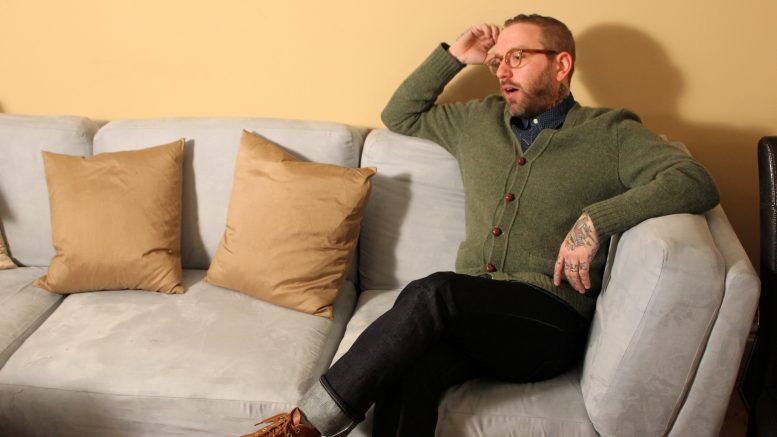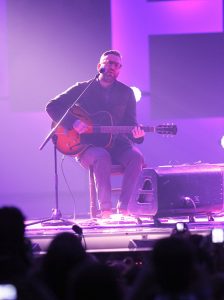GETTING THROUGH A LITTLE HELL
Story by Nick Krewen | May 30, 2011
For SOCAN Words And Music
When it comes to music, Dallas Green likes keeping his options open.
A few years after making his initial impact with the manic and aggressive post-hardcore quintet Alexisonfire, the tattoo-drenched guitarist with the dulcet singing voice introduced his softer, acoustic-driven alter ego, City And Colour.
And in January 2011, he teamed up with a Juno Award-winning rapper for the Shad and Dallas project Two Songs, a digital and 12-inch single of an original collaboration, “Live Forever,” and a remix of Shad’s “Listen” with proceeds donated to Skate4Cancer.
“There’s something to be said for playing where you’re barely strumming the guitar, singing quietly, and everybody’s listening.”
“I just like music in general,” Green declares from a City and Colour tour stop in Chicago. “I think that’s apparent coming from the two projects that I’ve put out [Alexisonfire and City and Colour]. Even recently, I collaborated with my friend Shad where I sing, he raps – and people were shocked. But I like and am inspired by all different types of music.”
Fluctuating freely between his two main outlets is the liberating route Green prefers. He’s experienced global success with both Alexisonfire (500,000 sales over four studio albums) and City And Colour (300,000 in sales, including Canadian gold for his first studio album Sometimes and platinum for Bring Me Your Love). That kind of track record enables the Dine Alone Records artist (Vagrant in the U.S., Arts & Crafts in Mexico) to indulge his desires.
“Sometimes it’s really fun to turn your guitar up really loud,” says the St. Catharines native. “Anybody who has played guitar distorted through an amplifier knows how fun that can be. But there’s also something to be said about playing in a huge room where everyone is completely quiet – you’re barely strumming the guitar, singing quietly, and everybody’s listening. I think I’ve learned in my years in the business to just do what I want to do, and I know that I can not please everyone.”
This year, however, it seems that the majority of Green’s focus will be devoted to pleasing City And Colour fans with his just-released third studio album, Little Hell. He’s already toured parts of the U.S. (including a Coachella Festival appearance), completed a six-date sellout run in Australia and performed a one-off, sold-out show at London’s Royal Albert Hall. One expects that the 11-song Little Hell, the most confident of City and Colour’s three studio albums, will only expand that following.
Since the release of 2007’s Bring Me Your Love, Green, 30, has been named Songwriter of the Year at the 2009 JUNO Awards (for “Waiting…” and “Sleeping Sickness”) and married So You Think You Can Dance Canada host Leah Miller. But despite marital bliss and a thriving career, Green admits that his often-sweet melodies rarely dwell on the subject of happiness.
“I’m drawn more towards minor chords and sort of a melancholic approach,” Green explains. “That’s just what I enjoy writing, and it seems to come out more often than not. Happier songs just don’t seem to be in me, and that’s fine – I’ve tried to write songs more on that path, but they just don’t make sense and don’t feel good to me.”
The songs on Little Hell aren’t mythical by any means: Green says he writes exclusively about his own experiences. “Every song that I write is about something that I’ve been through or something that has to do with me,” he notes. “But I feel that I can write them in a relatable way so people can listen and equate it to what they’re going through. I feel like someone could listen to ‘Oh Sister’ and change the word ‘Sister’ to ‘Brother’ or ‘Father’ or ‘Mother’ or ‘Aunt’ or ‘Cousin’ or ‘Best Friend.’ We’ve all had to deal with something with somebody.
“Lyrically, I wanted to write a song about what I was going through with my sister, so I did. And I wanted to write a song about my father called ‘The Grand Optimist’ because that’s what I call him, so I did. I wanted to write a song about my wife’s night terrors, so I did [“Fragile Bird”].”
Green isn’t afraid of tackling his most personal relationship in song either. “The song ‘Little Hell’ is actually about being married and being in a relationship with someone,” he says, before correcting himself. “Actually, not necessarily married but being in that relationship with someone. It’s about going through those rough patches and getting through to the other side.”
He liked the song so much that he thought it would make an appropriate album title. “The idea behind Little Hell is that I feel that life is all about the little hells you need to get through in order to enjoy the good parts. That’s sort of what the song is about: getting through a little hell with a particular someone.
“The recording process kind of went that way too. There were a lot of little hiccups and bumps in the road, but I feel now that with the finished product it was worth going through all of that to get to the other side. That’s why Little Hell made more sense than anything else as a title for the record.”
One of those hiccups was a tragic one: Bring Me Your Love co-producer and engineer Dan Achen died March 15, 2010 while playing a pick-up hockey game in his native Hamilton.
“That was a tough one, especially because my original plan was to go back to the Church [Catherine Street North Studio, co-owned by Achen] with Dan,” recalls Green. “Once he passed away, a lot of other ideas were sort of thrown around. Then I decided to go back anyway. I just figured at that time it would be the perfect idea to pay homage to Dan – his spirit would be there.”

2009 Juno Awards. City and Colour with Gord Downie performs “Sleeping Sickness”. March 29, 2009. General Motors Place. Vancouver, British Columbia. Photo: CARAS/iPhoto
Joined in the studio by producer Alex Newport (The Melvins, The Mars Volta), Green managed to satisfy one Little Hell intention: he recorded the album on tape, rather than digital.
“I just wanted to do it,” states Green. “I wanted to make a record like they used to. I try to be as organic as humanly possible in the studio, so I figured, why not take it one step further? I feel like the music that I write should sound like there are people playing those songs; not people playing through a computer, and then throw a whole bunch of crap on it. To me it just sounds a little warmer, more real.”
The writing of Little Hell’s 11 songs was completed over the past year, with most of them germinating in Green’s Toronto basement. “I do most of my writing at home,” he admits. “For me, late at night when my wife’s asleep, I go down to the basement and finish up songs. Ideas can come at any time or at any place, but the song usually takes shape in my basement.”
Green says he’s a “100% melody guy first. Lyrics take me awhile. It’s something I still struggle to be happy with. Melodies come to me constantly, but there are nine or ten drafts of words before I’m happy with them.”
When it comes to his demos, Green says he lays his initial tracks down with GarageBand “as soon as I think I have a good structure, the bones of the song.” If he’s on tour, he’ll allow ideas to ferment. “When I’m tour, I sit with them and start thinking about what I’d like to add or change, and I’ll make notes in a book.” Green admits he will meticulously re-demo a song until he’s satisfied.
“I go over them with a fine-tooth comb and re-demo them to the point where I think it’s what it should sound like,” he explains. “Maybe the only thing that changes in the studio is the tempo. Maybe you end up going a little faster or a little slower, or maybe you add or take away instruments, depending on what it sounds like out of the speakers.”
And when the song is complete? “I’ll just smile after I hear it and know it’s done.”
That said, Dallas Green considers the Little Hell song “Hope For Now” to be his favourite on the record. “It’s the most important song to me, because that song is about how – no matter how many people tell me my music has changed their lives or saved them or inspired them to do things and be better at what they do – I still have this lack of faith in myself.
“It was also the hardest song for me to do because of the Wurlitzer piano throughout the beginning of the song. I’m nervous when it comes to playing the keys, and that was me just singing and playing keys – and I played drums on that song, too. It was really this big culmination of all the things I want to do in a song.”
Green says he’s pleased with his progress. “I feel like I’ve gotten better,” he admits. “I feel like I’m a better singer, a better guitar player and a better writer. That’s the goal – to get better with every release.”


